|
news
Philip
Roth, The Last Interview

By Pagine
Ebraiche staff
Two years ago on December 21, 2017, Italian scholar Elèna Mortara
walked through Manhattan’s Upper West Side on her way to her
appointment for a historic interview with American legendary writer
Philip Roth.
The result of that very special meeting, which apparently marked the
last interview granted by Roth was published in the journal of the
Philip Roth Society, the “Philip Roth Studies.”
“Up on the twelfth floor, near the threshold, just outside his open
door, there is Philip Roth, welcoming me. When I enter, I am flooded
with the light of the bright and spacious living room, with large
balcony-windows over the opposite wall open to the sight of the city.
Roth is wearing a slate-blue shirt and brown wool trousers. We sit in
this light-flooded space, with a low table filled with books next to
us, and start our conversation. It’s a friendly conversation, moving
from memories of his experience in Rome as a young man to family
recollections, from his encounters with other writers to reflections on
his books. There are moments of great laughter and sometimes surprising
discoveries to be made in this conversation. Roth is not only
welcoming, but also looks in great shape. “I’m happy,” he admits with
all simplicity, when I ask him how he feels, now that he has just
published a new splendid collection of essays (Why Write?, 2017) in the
United States,” Mortara wrote.
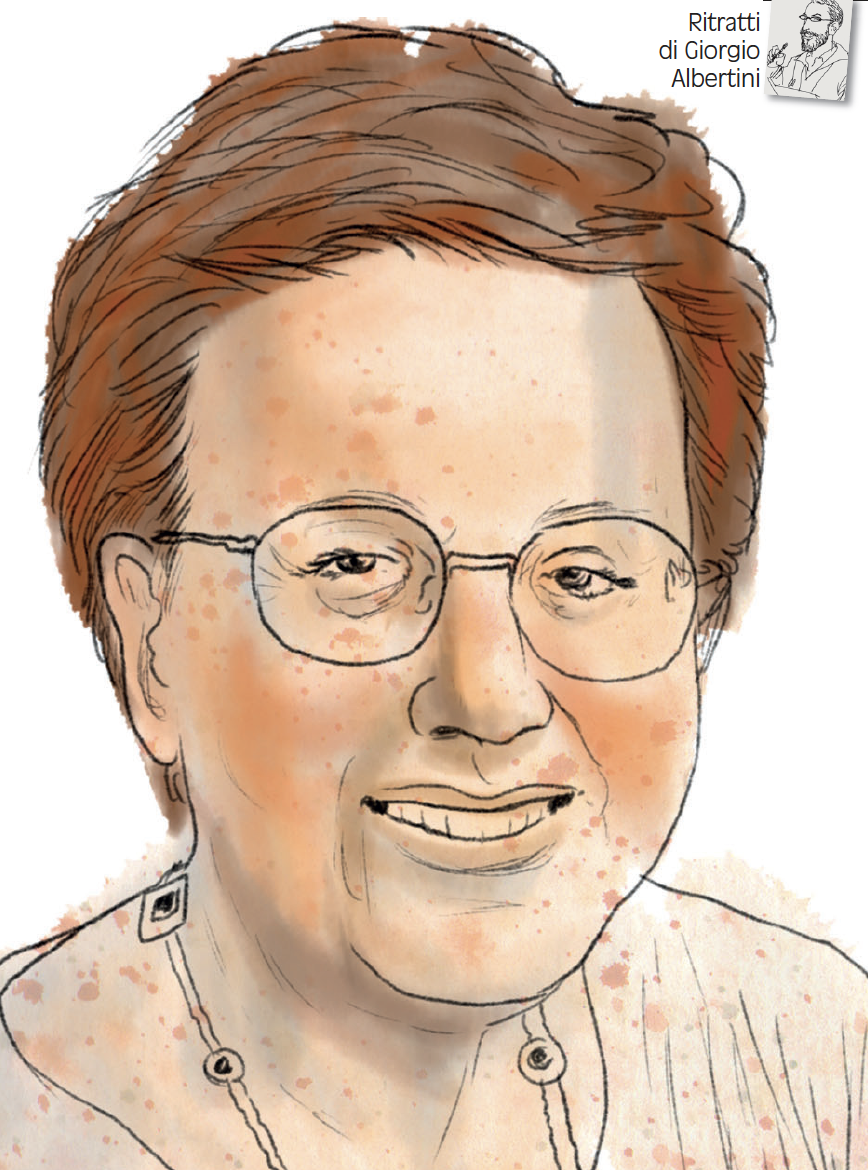 A
Professor of American Literature at the University of Tor
Vergata in Rome, Mortara is the editor of the first volume of Roth’s
works in the most prestigious Italian literary series, Meridiani
Mondadori. A
Professor of American Literature at the University of Tor
Vergata in Rome, Mortara is the editor of the first volume of Roth’s
works in the most prestigious Italian literary series, Meridiani
Mondadori.
At the time of
the interview, the first volume had been published only two months
before.
Among the topics they covered, were Kafka’s influence on Roth’s work,
as well as his Jewish roots.
“The Jewish families, they had a right to leave between 1880 and 1900.
And the first generation struggled, but their children, who had a step
up, who were more middle class, formed these family associations. They
were very common among Jews. They were kind of welfare societies, they
would loan money for burials, if someone was sick, they had a
scholarship fund for kids going to college, who didn’t happen to have
money. And then there was great family feeling among them. I, as a
little child, I loved going; when I was a little one, I loved going. I
think by the time this one was taken, I was too sophisticated!” Roth
told Mortara showing her a picture —with about 150 people sitting at
long tables in an elegant dining room, all relatives of his.
“You know, my parents, they were very important to me, because they
were so good and raised my brother and me with such warmth and love.
But also the community where I grew up, that neighborhood, was a big
neighborhood, Jewish neighborhood, was like a larger parent. Because
they were all Jews, there were a few Gentile families, but not very
many. I guess I was speaking to one of my old high-school friends on
the phone, he lives in Florida, and we speak once in a while, and he
said to me about Weequahic, our neighborhood: ‘It was so safe,’ he
said, ‘we felt so safe.’ And we really felt so safe,” he added.
Read
more
|
| |
|
NEWS
“Hanukkah,
the festival of lights”,
a short film on Rai Gulp
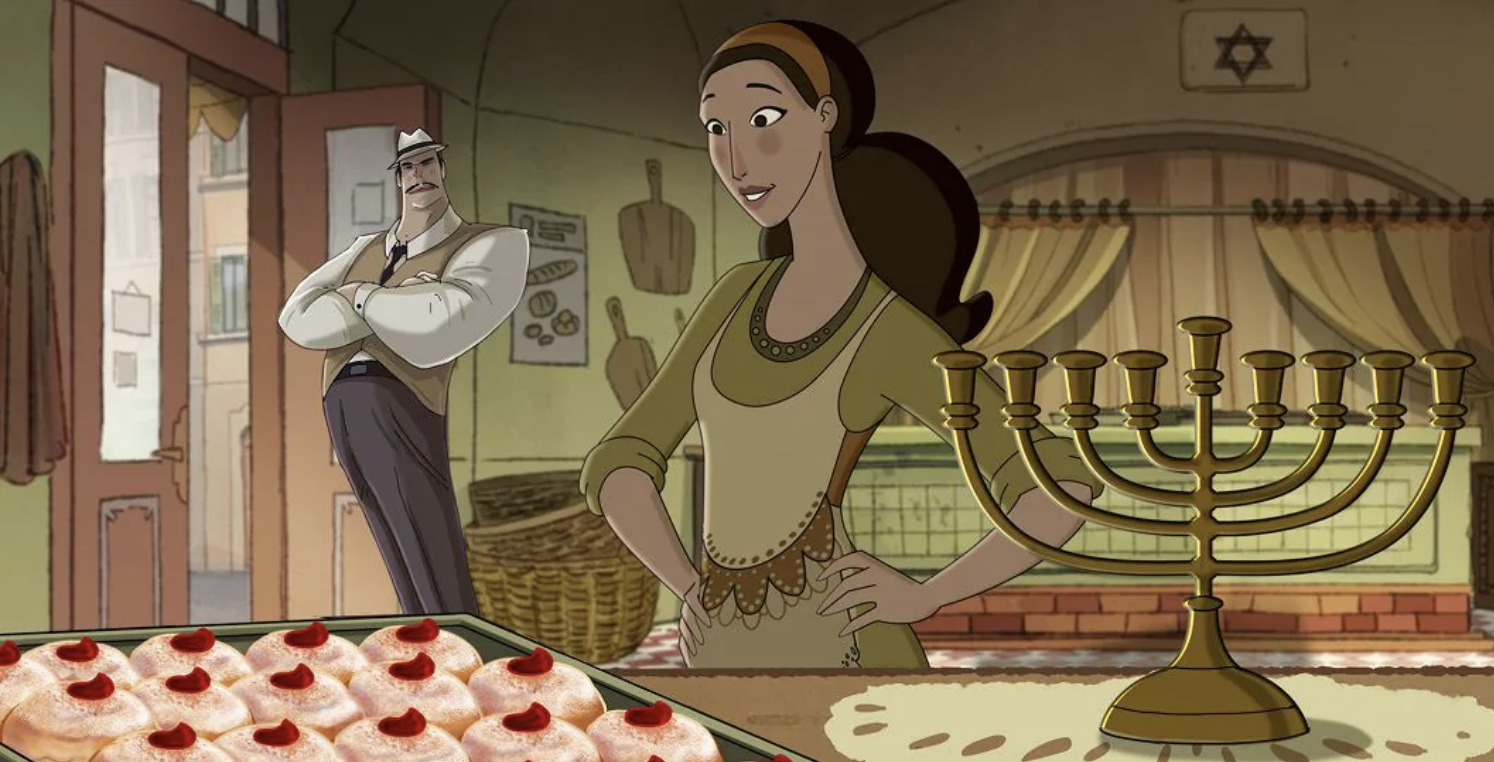
By Pagine
Ebraiche staff*
Rome, 1945. The Jewish Community is trying to recover from the
destruction caused by the Shoah, but their return to life and normality
meets several obstacles. The one met by Anna, a young baker, is
Antioco, an unscrupulous man who has eyed her business and would give
his right arm to get it. A true miracle is needed for her not to fall
in his schemes. Much like it happened at the time of the
Maccabees.
“Hanukkah – La festa delle luci (The festival of lights)”, an animated
short film directed by Maurizio Forestieri and dubbed by Luisa Ranieri
and Francesco Pannofino, is about new manifestations of courage which
still have in oil, which is now necessary to make thousands of
sufganiyot, a traditional cake served on that day, their source of
salvation..
Translated
by Sara Facelli and revised by Claudia Azzalini, both students at the
Advanced School for Interpreters and Translators of Trieste University
and interns at the newspaper office of the Union of the Italian Jewish
Communities.
Read
more
|
| |
|
NEWS
Italian Minister for Education visits
Jewish school in Rome ahead of Hanukkah
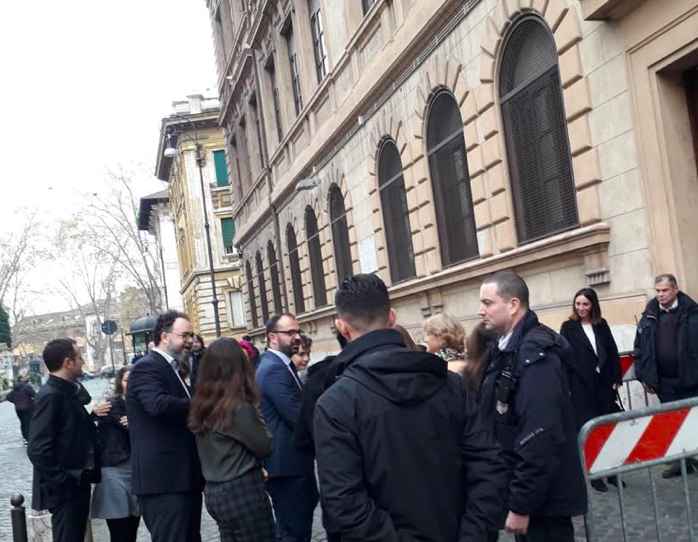
By Pagine
Ebraiche staff*
Lorenzo Fioramonti, the Italian Minister for Education,
University and Research visited the Jewish schools in Rome last week.
He was welcomed by Chief Rabbi Riccardo Di Segni; Ruth Dureghello, the
President of the Jewish Community; Noemi Di Segni, the President of the
Union of Italian Jewish Communities.
“Three exceptional guides – Rebecca, 10 years old; Fabio, 13 years old;
Martina, 17 years old – took me on a journey through Jewish culture and
traditions. There are many ongoing projects in Jewish schools: on
environmental education, international mobility, and the learning of
the English and Hebrew languages. Hanukkah is the Festival of Lights,
“which symbolizes the union of cultures, peoples, and nations”, said
the Minister at the end of the visit. The headmasters Rabbi Benedetto
Carucci Viterbi and Milena Pavoncello were also there to accompany him.
Translated by Sara Facelli and
revised by Claudia Azzalini, both students at the Advanced School for
Interpreters and Translators of Trieste University and interns at the
newspaper office of the Union of the Italian Jewish Communities.
Read
more
|
| |
|
NEWS
Israel Cycling Academy to race
in the Tour de France
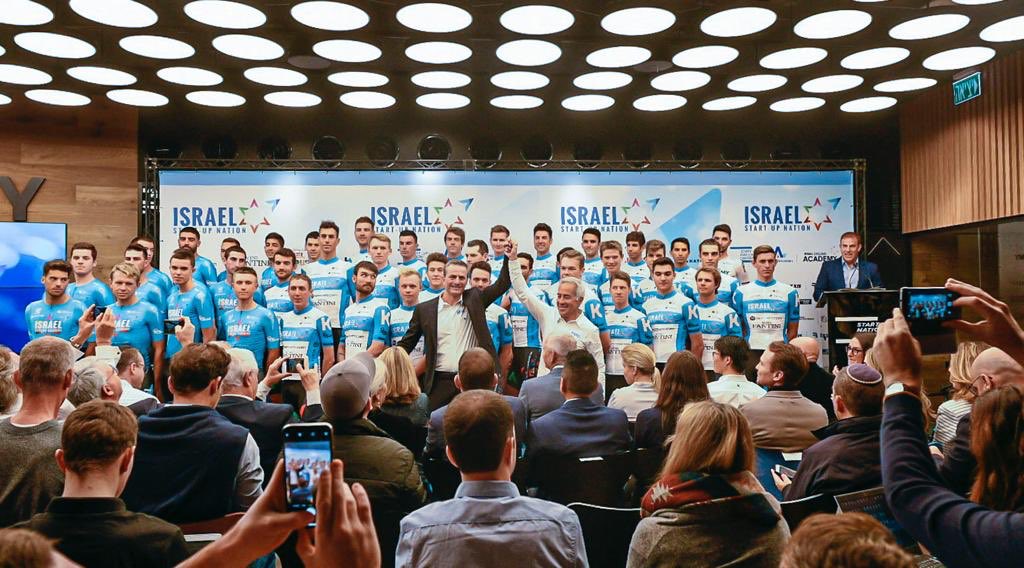
By Adam Smulevich*
“Our team will be made up of four Israelis and sixteen
non-Israelis, Jews, Christians and Muslims. Diversity is in our DNA and
the strength of Israel-Start Up Nation. We’re ready for some brand new
challenges and we will participate for the first time ever in the Tour
de France”. Sylvan Adams, full of enthusiasm, has recently presented in
Tel Aviv the new team formed by Israel-Start Up Nation (the new name of
Israel Cycling Academy), the first Israeli professional cycling team.
After participating in the Giro d’Italia, they have announced in style
their intention to run in the Tour de France and UCI World Tour.
Translated by Mattia Stefani and
revised by Claudia Azzalini, both students at the Advanced School of
Modern Languages for Interpreting and Translation of Trieste University
and interns at the newspaper office of the Union of the Italian Jewish
Communities.
Read
more
|
| |
|
bechol
lashon - Français
Qu’est-ce
que la liberté?
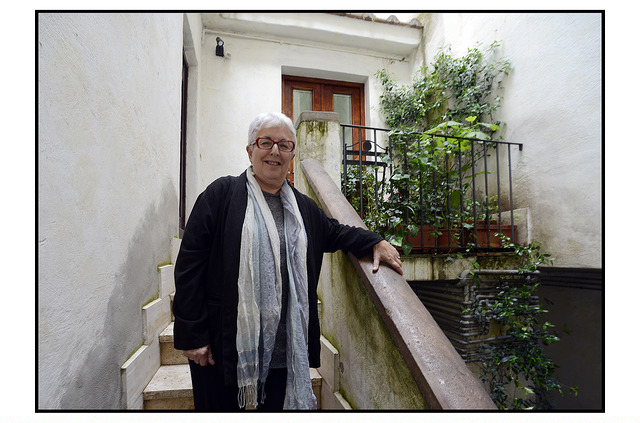
Anna Foa*
Je
ne sais pas quoi dire. Je n’ai envie de parler de rien d’autre que de
la mort de Piero Terracina, mais je vois qu’on a tout dit à ce sujet
dans ces dernières heures. Je voudrais donc évoquer un épisode qui a eu
lieu il y a beaucoup d’années lors de la journée du Souvenir dans une
école sarde qu’on a visitée ensemble. On avait demandé à Piero de
parler aux élèves plus âgés ainsi qu’aux enfants de 8-10 ans. Il avait
peur de les choquer avec ses mémoires du camp de concentration et de
trop s’émouvoir en parlant avec de petits enfants.
*Anna
Foa, historienne. Traduit par Mattia Stefani, étudiant de l’École
Supérieure pour les Interprètes et les Traducteurs de Trieste et
stagiaire dans le bureau du journal de l’Union des communautés juives
italiennes.
Lire sur la site
|
pilpul
Persecution
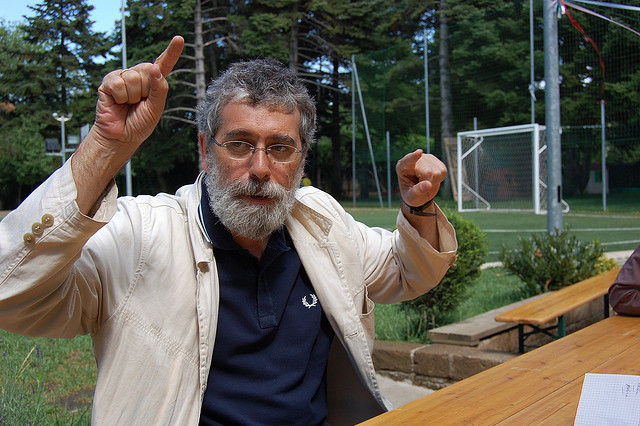
By David Bidussa*
Many years ago, in the late 1950s, Hannah Arendt argued that the only
painful fragment of reality granted to a pariah was the reality of
persecution. I have a feeling that, made sixty years in advance, this
reflection concerns us.
*David Bidussa is a
historian of social ideas.
Read
more
|
|
|
|
ITALICS
Josephus’s
The Jewish War, a Biography

By David Ruben*
Flavius Josephus, son of Matthias haKohen, better known as Josephus,
was well known to many earlier generations of Jews through a popular
book wrongly attributed to him, probably written in the latter half of
the first millennium. Passages from that book made their way into some
of the kinnot said on Tisha B’Av. Today, we know him, if we know of him
at all, as the author of The Jewish War (and other writings), an
eye-witness account of the revolt of the Jews against Rome, from 66 CE
until the destruction of the Second Temple in 70 CE (and afterwards,
the siege of Masada in 73-74). Professor Martin Goodman’s fine, erudite
Josephus’s ‘The Jewish War’ offers a thorough, scholarly history of
that book, its reception, its editions, its translations, and the
various controversies surrounding it.
*The article was
published in CBSnews on December 11, 2019.
Read
more
|
| |
|
|
This
newsletter is published under difficult conditions. The editors of this
newsletter are Italian journalists whose native language is Italian.
They are willing to offer their energy and their skills to give
international readers the opportunity of learning more about the
Italian Jewish world, its values, its culture and its traditions.
In spite of all our efforts to avoid this, readers may find an
occasional language mistake. We count on your understanding and on your
help and advice to correct these mistakes and improve our publication.
Pagine Ebraiche International Edition is published by the Union of
Italian Jewish Communities (UCEI). UCEI publications encourage an
understanding of the Jewish world and the debate within it. The
articles and opinions published by Pagine Ebraiche International
Edition, unless expressly stated otherwise, cannot be interpreted as
the official position of UCEI, but only as the self-expression of the
people who sign them, offering their comments to UCEI publications.
Readers who are interested in making their own contribution should
email us at desk@ucei.it
You received this newsletter because you authorized UCEI to contact
you. If you would like to remove your email address from our list, or
if you would like to subscribe using a new email address, please send a
blank email to desk@ucei.it
stating "unsubscribe" or "subscribe" in the subject field.
© UCEI - All rights reserved - The articles may only be reproduced
after obtaining the written permission of the editor-in-chief. Pagine
Ebraiche - Reg Rome Court 199/2009 – Editor in Chief: Guido Vitale.
Special thanks to: Francesco Moises Bassano, Susanna Barki, Amanda
Benjamin, Monica Bizzio, Angelica Edna Calò Livne, Eliezer Di Martino,
Alain Elkann, Dori Fleekop, Daniela Fubini, Benedetta Guetta, Sarah
Kaminski, Daniel Leisawitz, Annette Leckart, Gadi Luzzatto Voghera,
Yaakov Mascetti, Francesca Matalon, Jonathan Misrachi, Anna Momigliano,
Giovanni Montenero, Elèna Mortara, Sabina Muccigrosso, Lisa Palmieri
Billig, Jazmine Pignatello, Shirley Piperno, Giandomenico Pozzi, Daniel
Reichel, Colby Robbins, Danielle Rockman, Lindsay Shedlin,
Michael Sierra, Rachel Silvera, Adam Smulevich, Simone Somekh, Rossella
Tercatin, Ada Treves, Lauren Waldman, Sahar Zivan.
Questo notiziario è realizzato in condizioni di particolare difficoltà.
I redattori di questo notiziario sono giornalisti italiani di
madrelingua italiana. Mettono a disposizione le loro energie e le loro
competenze per raccontare in lingua inglese l'ebraismo italiano, i suoi
valori, la sua cultura e i suoi valori. Nonostante il nostro impegno il
lettore potrebbe trovare errori e imperfezioni nell'utilizzo del
linguaggio che faremo del nostro meglio per evitare. Contiamo sulla
vostra comprensione e soprattutto sul vostro aiuto e sul vostro
consiglio per correggere gli errori e migliorare.
Pagine Ebraiche International Edition è una pubblicazione edita
dall'Unione delle Comunità Ebraiche Italiane. L'UCEI sviluppa mezzi di
comunicazione che incoraggiano la conoscenza e il confronto delle
realtà ebraiche. Gli articoli e i commenti pubblicati, a meno che non
sia espressamente indicato il contrario, non possono essere intesi come
una presa di posizione ufficiale, ma solo come la autonoma espressione
delle persone che li firmano e che si sono rese gratuitamente
disponibili. Gli utenti che fossero interessati a offrire un proprio
contributo possono rivolgersi all'indirizzo desk@ucei.it
Avete ricevuto questo messaggio perché avete trasmesso a Ucei
l'autorizzazione a comunicare con voi. Se non desiderate ricevere
ulteriori comunicazioni o se volete comunicare un nuovo indirizzo
email, scrivete a: desk@ucei.it
indicando nell'oggetto del messaggio "cancella" o "modifica".
© UCEI - Tutti i diritti riservati - I testi possono essere riprodotti
solo dopo aver ottenuto l'autorizzazione scritta della Direzione.
Pagine Ebraiche International Edition - notiziario dell'ebraismo
italiano - Reg. Tribunale di Roma 199/2009 - direttore responsabile:
Guido Vitale.
Realizzato con il contributo di: Francesco Moises Bassano, Susanna
Barki, Amanda Benjamin, Monica Bizzio, Angelica Edna Calò Livne,
Eliezer Di Martino, Alain Elkann, Dori Fleekop, Daniela Fubini,
Benedetta Guetta, Sarah Kaminski, Daniel Leisawitz, Annette Leckart,
Gadi Luzzatto Voghera, Yaakov Mascetti, Francesca Matalon, Jonathan
Misrachi, Anna Momigliano, Giovanni Montenero, Elèna Mortara, Sabina
Muccigrosso, Lisa Palmieri Billig, Jazmine Pignatello, Shirley Piperno,
Giandomenico Pozzi, Daniel Reichel, Colby Robbins, Danielle
Rockman, Lindsay Shedlin, Michael Sierra, Rachel Silvera, Adam
Smulevich, Simone Somekh, Rossella Tercatin, Ada Treves, Lauren
Waldman, Sahar Zivan.
|












